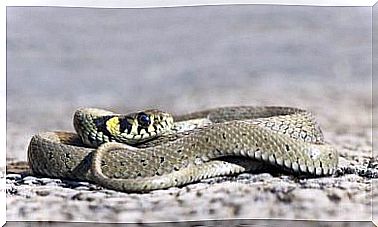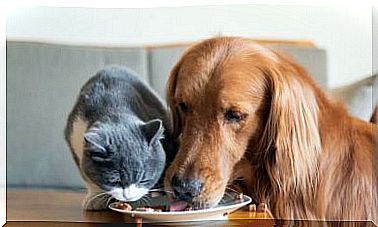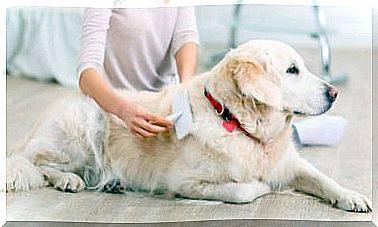Causes Of Vomiting In Puppies
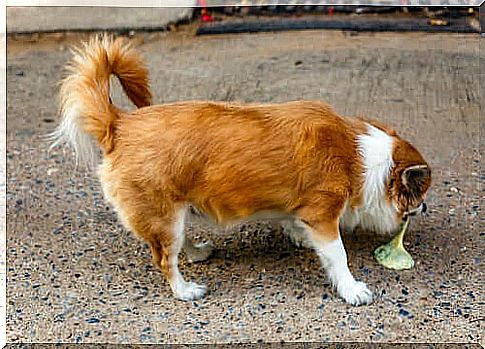
Vomiting in puppies is an important clinical sign. This is due to the fragility of young dogs that, when their fluids are deregulated, can reach a state of dehydration.
Thus, while the approach of waiting and watching for symptom progress may be warranted among adult dogs, vomiting should always be considered a potentially serious sign in a very young dog.
In this article, we’ll talk about the likely causes of vomiting in puppies, as well as how to treat them.
Vomiting versus regurgitation
Before talking about the causes of vomiting, we must distinguish between vomiting and regurgitation. When dogs vomit, they forcefully expel the contents of their stomach and upper small intestine, which can carry food, liquid and waste into their mat.
Before vomiting, there are usually signs of nausea, such as excessive drooling, drooling, and abdominal contractions, just as we do.
However, the regurgitation process is different. Rather than forcefully expelling stomach contents, regurgitation is a passive movement that expels undigested food and liquid.
Unlike vomiting, the signs of regurgitation are difficulty breathing and coughing. One way to tell if your dog has regurgitated instead of vomiting is to see what he vomited. Regurgitated substances are not digested and can maintain the cylindrical shape of the esophagus.
Your veterinarian will need to differentiate between regurgitation and vomiting because the two symptoms have very different causes and treatments.
What are the most common causes of vomiting in puppies?
Many cases of vomiting in puppies are the result of gastric irritation due to ingestion of something inappropriate. They can occur as a result of eating inedible objects, irritating or spoiled foods, or simply because they ate too much or too quickly.

Puppies are at special risk of contracting infections, such as distemper or parvovirus, especially if they have not completed the vaccination course.
Intestinal parasites are another common cause of vomiting in puppies, as well as heat stroke, medications or illnesses such as pancreatitis, for example.
Medical Conditions That Can Cause Regurgitation in Puppies
Regurgitation can occur in any breed, although some of them are predisposed to this condition. Among them, we can cite the fox terrier, the miniature schnauzer, the Great Dane, the German Shepherd, the Irish Setter, the Labrador, the Newfoundland and the Chinese shar-pei.
Regurgitation can occur for different reasons, including:
- Congenital problems – present from before birth – in the throat or esophagus.
- Acquired throat problems that may involve cancer, foreign bodies, anger, poisoning, or muscle diseases (myopathies).
- Acquired esophageal disease, which can develop from an enlarged esophagus, tumor, cancer, or hiatal hernia.
- Narrowing of the esophagus or problems with the autonomic nervous system.
If vomiting in puppies occurs repeatedly or is accompanied by diarrhea, or if there is unproductive vomiting (just craving) with blood or other abnormal materials, these are serious situations that require an urgent visit to the veterinarian.
Treatment and Prevention of Vomiting in Puppies
Vomiting can be a sign of a dangerous illness. Even if the underlying cause is not serious, vomiting, whatever the reason, can cause dehydration and other problems that can kill puppies very quickly.
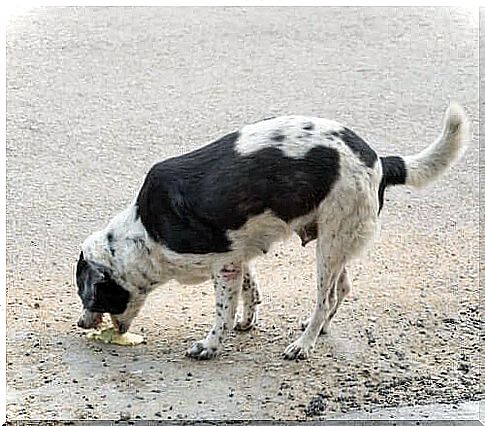
So whenever a puppy vomits multiple times in a single day, vomits chronically, or has additional symptoms such as diarrhea or lethargy, you should call your veterinarian.
Once your veterinarian has determined the cause of your dog’s vomiting, he or she will develop a treatment plan based on your dog’s cause and condition. Hospitalization may be necessary in severe cases.
Feeding on a light diet
Your veterinarian may also recommend a light diet for a few days to help your puppy recover. There are commercially available foods, or you can prepare white rice and skinless cooked chicken while your puppy is recovering.
Also, make sure your puppy continues to drink an adequate amount of water. If your puppy has a more serious condition causing vomiting, your veterinarian will prescribe appropriate medical treatment.
Try to make him eat more slowly
If your puppy is healthy but is eating and vomiting right after meals, he may be eating too fast. Try to make him slow down his ingestion. The following measures can help:
- Feed the puppies in separate places to reduce the feeling of ‘competition’.
- Place a large inedible object on the plate so the puppy can be forced to eat around it.
- Feed your puppy several small meals throughout the day.
Finally, in case of vomiting in puppies, always consult your veterinarian before administering any medication, as it is the veterinarian who will be able to offer the best recommendations.

